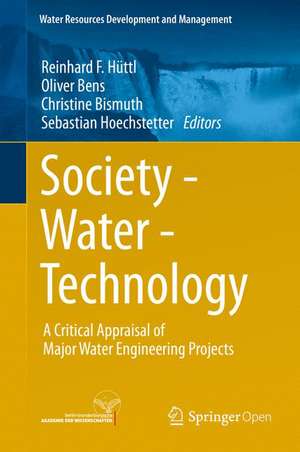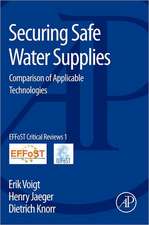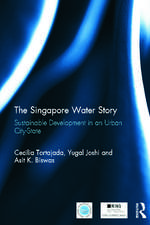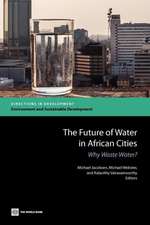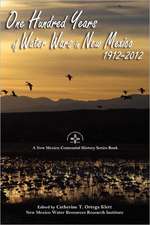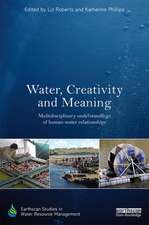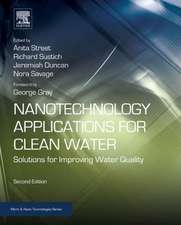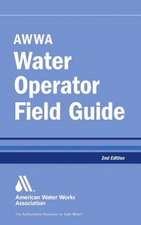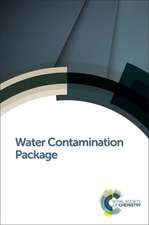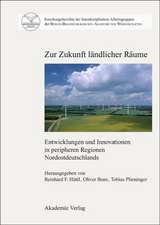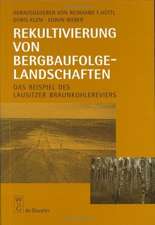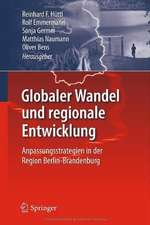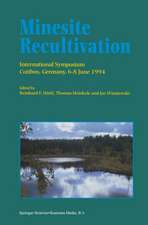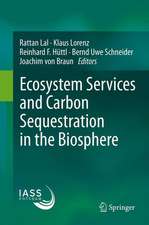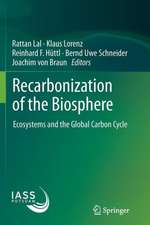Society - Water - Technology: A Critical Appraisal of Major Water Engineering Projects: Water Resources Development and Management
Editat de Reinhard F. Hüttl, Oliver Bens, Christine Bismuth, Sebastian Hoechstetteren Limba Engleză Hardback – 11 noi 2015
In the past, MWEPs have been used as an instrument to cope with the demands of growing populations and to enhance development progress. Experiences with MWEPs have shown that a purely technical approach has not always brought about thedesired results. In many cases, MWEPs have even resulted in negative implications for society and environment. Therefore, improved management strategies and enhanced technologies for a sustainable water resource management system are a prerequisite to meet present and future challenges. And, moreover, the continuous evaluation and optimisation of these measures is, likewise, a must.
| Toate formatele și edițiile | Preț | Express |
|---|---|---|
| Paperback (1) | 422.52 lei 6-8 săpt. | |
| Springer International Publishing – 23 aug 2016 | 422.52 lei 6-8 săpt. | |
| Hardback (1) | 395.45 lei 38-44 zile | |
| Springer International Publishing – 11 noi 2015 | 395.45 lei 38-44 zile |
Din seria Water Resources Development and Management
-
 Preț: 423.66 lei
Preț: 423.66 lei - 18%
 Preț: 906.33 lei
Preț: 906.33 lei - 18%
 Preț: 1399.43 lei
Preț: 1399.43 lei - 18%
 Preț: 953.65 lei
Preț: 953.65 lei - 15%
 Preț: 532.70 lei
Preț: 532.70 lei - 15%
 Preț: 645.28 lei
Preț: 645.28 lei -
 Preț: 396.40 lei
Preț: 396.40 lei - 15%
 Preț: 646.11 lei
Preț: 646.11 lei - 23%
 Preț: 1511.96 lei
Preț: 1511.96 lei - 18%
 Preț: 956.18 lei
Preț: 956.18 lei - 15%
 Preț: 653.33 lei
Preț: 653.33 lei - 15%
 Preț: 702.87 lei
Preț: 702.87 lei - 15%
 Preț: 522.89 lei
Preț: 522.89 lei - 15%
 Preț: 646.62 lei
Preț: 646.62 lei -
 Preț: 378.92 lei
Preț: 378.92 lei - 15%
 Preț: 644.95 lei
Preț: 644.95 lei - 15%
 Preț: 582.45 lei
Preț: 582.45 lei - 18%
 Preț: 897.02 lei
Preț: 897.02 lei - 15%
 Preț: 703.06 lei
Preț: 703.06 lei -
 Preț: 395.09 lei
Preț: 395.09 lei - 15%
 Preț: 643.48 lei
Preț: 643.48 lei - 15%
 Preț: 641.03 lei
Preț: 641.03 lei -
 Preț: 481.05 lei
Preț: 481.05 lei - 15%
 Preț: 579.99 lei
Preț: 579.99 lei - 15%
 Preț: 642.51 lei
Preț: 642.51 lei - 18%
 Preț: 905.85 lei
Preț: 905.85 lei - 15%
 Preț: 648.89 lei
Preț: 648.89 lei - 15%
 Preț: 644.18 lei
Preț: 644.18 lei
Preț: 395.45 lei
Nou
Puncte Express: 593
Preț estimativ în valută:
75.68€ • 78.72$ • 62.48£
75.68€ • 78.72$ • 62.48£
Carte tipărită la comandă
Livrare economică 11-17 aprilie
Preluare comenzi: 021 569.72.76
Specificații
ISBN-13: 9783319189703
ISBN-10: 3319189700
Pagini: 240
Ilustrații: XIX, 295 p.
Dimensiuni: 155 x 235 x 19 mm
Greutate: 0.76 kg
Ediția:1st ed. 2016
Editura: Springer International Publishing
Colecția Springer
Seria Water Resources Development and Management
Locul publicării:Cham, Switzerland
ISBN-10: 3319189700
Pagini: 240
Ilustrații: XIX, 295 p.
Dimensiuni: 155 x 235 x 19 mm
Greutate: 0.76 kg
Ediția:1st ed. 2016
Editura: Springer International Publishing
Colecția Springer
Seria Water Resources Development and Management
Locul publicării:Cham, Switzerland
Public țintă
ResearchCuprins
Part I: Context and Objective.- Introduction: A Critical Appraisal of Major Water Engineering Projects and the Need for Interdisciplinary Approaches.- Water Ethics – Orientation for Water Conflicts as Part of Inter- and Transdisciplinary Deliberation.- Part II: Major Water Engineering Projects – Challenges, Problems, Opportunities.- Major Water Engineering Projects: Definitions, Framework Conditions, Systemic Effects.- A Global View on Future Major Water Engineering Projects.- Neglected Values of Major Water Engineering Projects: Ecosystem Services, Social Impacts and Economic Valuation.- Water Governance: A Systemic Approach.- Research in two Case Studies: Irrigation and Land Use in the Fergana Valley and Water Management in the Lower Jordan Valley.- Part III: The Fergana Valley – Uzbekistan’s Hydro-Agricultural System between Inertia and Change.- Between Multiple Transformations and Systemic Path Dependencies.- From Upscaling to Rescaling – Transforming the Fergana from Tsarist Irrigation to Water Management for an Independent Uzbekistan.- Irrigation Infrastructure in Fergana Today: Ecological Implications –Economic Necessities.- Where Water Meets Agriculture: The Ambivalent Role of the Water Users Associations.- Theory, the Market and the State: Agricultural Reforms in Post Socialist Uzbekistan between Economic Incentives and Institutional Obstacles.- Part IV: The Lower Jordan Valley – The Red Sea-Dead Sea Conveyance Project and its Complex History.- Water Resources, Cooperation and Power Asymmetries in the Water Management of the Lower Jordan Valley – The Situation Today and the Path that has led there.- Reclaiming the Dead Sea: Alternatives for Action.- Jordan’s Shadow State and Water Management: Prospects for Water Security will depend on Politics and Regional Cooperation.- Technologies, Incentives and Cost Recovery: Is there an Israeli Role Model?.- Part V: Outlook and Options for Action.- Lessons Learnt, Open Research Questions and Recommendations.
Notă biografică
Reinhard F. Hüttl
Reinhard F. Hüttl is chairman of the board and scientific executive director of the German Research Centre for Geosciences in Potsdam (GFZ). He is member of the Berlin-Brandenburg Academy of Sciences and Humanities (BBAW) and president of the German Academy of Science and Engineering (acatech). He is a professor of the Soil Protection and Recultivation Department at the Brandenburg Technical University in Cottbus (BTU) and spokesperson of the Interdisciplinary Research Group “Society – Water – Technology” at the BBAW. Hüttl, R. F., Schwartze, S. (2013): Editorial: Zentralasien; ein Reallabor und Observatorium für die Geowissenschaften. System Erde, 3(2), p. 5–5.
Grünewald, U., Bens, O., Fischer, H., Hüttl, R. F. J., Kaiser, K., Knierim, A. (Eds.) (2012): Wasserbezogene Anpassungsmaßnahmen an den Landschafts- und Klimawandel, Stuttgart: Schweizerbart, 299.
Hüttl, R. F., Bens, O. (Eds.) (2012): Georessource Wasser – Herausforderung Globaler Wandel: Beiträgezu einer integrierten Wasserressourcenbewirtschaftung in Deutschland, acatech Studie, München.
Frede, H.-G., Bücker, A., Hüttl, R. F. et al. (2012): Wassernutzung und Wassereffizienz in Landschaften. In: Hüttl, R. F., Bens, O. (Eds.): Georessource Wasser – Herausforderung Globaler Wandel: Beiträge zu einer integrierten Wasserressourcenbewirtschaftung in Deutschland, acatech Studie, München, p. 91–157.
Germer, S., Bens, O., Hüttl, R. F. (2011): Global Change: Challenges for Regional Water Resources, Editorial. Die Erde, 142(1-2).
Hüttl, R. F, Emmermann, R., Germer, S., Naumann, M., Bens, O. (Eds.) (2011): Globaler Wandel und regionale Entwicklung. Anpassungsstrategien in der Region Berlin-Brandenburg, Heidelberg: Springer.
Oliver Bens
Oliver Bens is head of staff of the scientific executive board of the German Research Centre for Geosciences in Potsdam (GFZ). As a geoscientist, he is responsible for the research field earth and environment and in charge of media and communication at GFZ. He is a member of the Brandenburg Council for Sustainable Development.
Hoechstetter, S., Bens, O., Bismuth, C. (2013): Konflikte um die Georessource Wasser in Zentralasien: Analyse und Neuausrichtung von Entwicklungspfaden im Ferganatal. System Erde, 3(2) p. 50–55.
Grünewald, U., Bens, O., Fischer, H., Hüttl, R. F. J., Kaiser, K., Knierim, A. (Eds.) (2012): Wasserbezogene Anpassungsmaßnahmen an den Landschafts- und Klimawandel, Stuttgart: Schweizbart.
Hüttl, R. F., Bens, O. (Eds. ) (2012): Georessource Wasser – Herausforderung Globaler Wandel: Beiträge zu einer integrierten Wasserressourcenbewirtschaftung in Deutschland, acatech Studie, München.
Frede, H.-G., Bücker, A., Bens, O. et al. (2012): Wassernutzung und Wassereffizienz in Landschaften . In: Hüttl, R. F., Bens, O. (Eds.): Georessource Wasser – Herausforderung Globaler Wandel: Beiträge zu einer integrierten Wasserressourcenbewirtschaftung in Deutschland, acatech Studie, München, p. 91–157.
Germer, S., Bens, O. & Hüttl, R. F. (2011): Global Change : Challenges for Regional Water Resources, Editorial. Die Erde, 142(1-2).
Hüttl, R. F, Emmermann, R., Germer, S., Naumann, M., Bens, O. (Eds.) (2011): Globaler Wandel und regionale Entwicklung. Anpassungsstrategien in der Region Berlin-Brandenburg, Heidelberg: Springer.
Sebastian Hoechstetter
Sebastian Hoechstetter is a research consultant and a research associate at the German Research Centre for Geosciences in Potsdam (GFZ). With a geoecological background his research interests include landscape ecology, climate adaptation, urban ecology and water research. He is a research associate in the Interdisciplinary Research Group “Society – Water – Technology” at the BBAW.
Hoechstetter, S., Bens, O., Bismuth, C. (2013): Konflikte um die Georessource Wasser in Zentralasien: Analyse und Neuausrichtung von Entwicklungspfaden im Ferganatal. System Erde, 3(2), p. 50–55.
Hoechstetter, S. (2009): Enhanced methods for analysing landscape structure: Landscape metrics for characterising three-dimensional patterns and ecological gradients, (Fernerkundung und angewandte Geoinformatik; 6), Rhombos Verlag.
Christine Bismuth
Christine Bismuth is the scientific coordinator of the Interdisciplinary Research Group “Society – Water – Technology” at the BBAW. She is an environmental scientist and has worked as a research associate at the Institute of Earth and Environmental Science at the University of Potsdam.
Hoechstetter, S., Bens, O., Bismuth, C. (2013): Konflikte um die Georessource Wasser in Zentralasien: Analyse und Neuausrichtung von Entwicklungspfaden im Ferganatal. System Erde, 3(2), p. 50–55.
Reinhard F. Hüttl is chairman of the board and scientific executive director of the German Research Centre for Geosciences in Potsdam (GFZ). He is member of the Berlin-Brandenburg Academy of Sciences and Humanities (BBAW) and president of the German Academy of Science and Engineering (acatech). He is a professor of the Soil Protection and Recultivation Department at the Brandenburg Technical University in Cottbus (BTU) and spokesperson of the Interdisciplinary Research Group “Society – Water – Technology” at the BBAW. Hüttl, R. F., Schwartze, S. (2013): Editorial: Zentralasien; ein Reallabor und Observatorium für die Geowissenschaften. System Erde, 3(2), p. 5–5.
Grünewald, U., Bens, O., Fischer, H., Hüttl, R. F. J., Kaiser, K., Knierim, A. (Eds.) (2012): Wasserbezogene Anpassungsmaßnahmen an den Landschafts- und Klimawandel, Stuttgart: Schweizerbart, 299.
Hüttl, R. F., Bens, O. (Eds.) (2012): Georessource Wasser – Herausforderung Globaler Wandel: Beiträgezu einer integrierten Wasserressourcenbewirtschaftung in Deutschland, acatech Studie, München.
Frede, H.-G., Bücker, A., Hüttl, R. F. et al. (2012): Wassernutzung und Wassereffizienz in Landschaften. In: Hüttl, R. F., Bens, O. (Eds.): Georessource Wasser – Herausforderung Globaler Wandel: Beiträge zu einer integrierten Wasserressourcenbewirtschaftung in Deutschland, acatech Studie, München, p. 91–157.
Germer, S., Bens, O., Hüttl, R. F. (2011): Global Change: Challenges for Regional Water Resources, Editorial. Die Erde, 142(1-2).
Hüttl, R. F, Emmermann, R., Germer, S., Naumann, M., Bens, O. (Eds.) (2011): Globaler Wandel und regionale Entwicklung. Anpassungsstrategien in der Region Berlin-Brandenburg, Heidelberg: Springer.
Oliver Bens
Oliver Bens is head of staff of the scientific executive board of the German Research Centre for Geosciences in Potsdam (GFZ). As a geoscientist, he is responsible for the research field earth and environment and in charge of media and communication at GFZ. He is a member of the Brandenburg Council for Sustainable Development.
Hoechstetter, S., Bens, O., Bismuth, C. (2013): Konflikte um die Georessource Wasser in Zentralasien: Analyse und Neuausrichtung von Entwicklungspfaden im Ferganatal. System Erde, 3(2) p. 50–55.
Grünewald, U., Bens, O., Fischer, H., Hüttl, R. F. J., Kaiser, K., Knierim, A. (Eds.) (2012): Wasserbezogene Anpassungsmaßnahmen an den Landschafts- und Klimawandel, Stuttgart: Schweizbart.
Hüttl, R. F., Bens, O. (Eds. ) (2012): Georessource Wasser – Herausforderung Globaler Wandel: Beiträge zu einer integrierten Wasserressourcenbewirtschaftung in Deutschland, acatech Studie, München.
Frede, H.-G., Bücker, A., Bens, O. et al. (2012): Wassernutzung und Wassereffizienz in Landschaften . In: Hüttl, R. F., Bens, O. (Eds.): Georessource Wasser – Herausforderung Globaler Wandel: Beiträge zu einer integrierten Wasserressourcenbewirtschaftung in Deutschland, acatech Studie, München, p. 91–157.
Germer, S., Bens, O. & Hüttl, R. F. (2011): Global Change : Challenges for Regional Water Resources, Editorial. Die Erde, 142(1-2).
Hüttl, R. F, Emmermann, R., Germer, S., Naumann, M., Bens, O. (Eds.) (2011): Globaler Wandel und regionale Entwicklung. Anpassungsstrategien in der Region Berlin-Brandenburg, Heidelberg: Springer.
Sebastian Hoechstetter
Sebastian Hoechstetter is a research consultant and a research associate at the German Research Centre for Geosciences in Potsdam (GFZ). With a geoecological background his research interests include landscape ecology, climate adaptation, urban ecology and water research. He is a research associate in the Interdisciplinary Research Group “Society – Water – Technology” at the BBAW.
Hoechstetter, S., Bens, O., Bismuth, C. (2013): Konflikte um die Georessource Wasser in Zentralasien: Analyse und Neuausrichtung von Entwicklungspfaden im Ferganatal. System Erde, 3(2), p. 50–55.
Hoechstetter, S. (2009): Enhanced methods for analysing landscape structure: Landscape metrics for characterising three-dimensional patterns and ecological gradients, (Fernerkundung und angewandte Geoinformatik; 6), Rhombos Verlag.
Christine Bismuth
Christine Bismuth is the scientific coordinator of the Interdisciplinary Research Group “Society – Water – Technology” at the BBAW. She is an environmental scientist and has worked as a research associate at the Institute of Earth and Environmental Science at the University of Potsdam.
Hoechstetter, S., Bens, O., Bismuth, C. (2013): Konflikte um die Georessource Wasser in Zentralasien: Analyse und Neuausrichtung von Entwicklungspfaden im Ferganatal. System Erde, 3(2), p. 50–55.
Textul de pe ultima copertă
This book presents the results of the Interdisciplinary Research Group "Society – Water – Technology" of the Berlin-Brandenburg Academy of Sciences and Humanities. It describes interdisciplinary evaluation criteria for major water engineering projects (MWEPs) and portrays an application to the Lower Jordan Valley (Middle East) and the Fergana Valley (Central Asia). Both areas are characterised by transboundary conflicts, by challenges due to demographic and climate change, and by political and societal pressures. Based on the findings, the book provides recommendations for science and political decisions makers as well as for international financing institutions. In addition, it outlines research gaps from an interdisciplinary perspective.
In the past, MWEPs have been used as an instrument to cope with the demands of growing populations and to enhance development progress. Experiences with MWEPs have shown that a purely technical approach has not always brought about the desired results. In many cases, MWEPs have even resulted in negative implications for society and environment. Therefore, improved management strategies and enhanced technologies for a sustainable water resource management system are a prerequisite to meet present and future challenges. And, moreover, the continuous evaluation and optimisation of these measures is, likewise, a must.
Caracteristici
Offers a comprehensive and interdisciplinary approach to the evaluation of major water engineering projects Social and environmental aspects are taken in full consideration for the evaluation of technical projects Gives an outlook on the perspectives of major water engineering projects, their relevance in the past and the future and on the undesired path dependencies as a result of their implementations Includes a world-wide map with planned major water engineering projects and their expected effects on nature resources and societies Shares valuable ideas for decisions makers on planning water management policies in a sustainable way and redirecting funding sources in ways that consider both environmental and human needs Special focus is given to the possibilities of path creation in order to give new opportunities in locked in situations Includes supplementary material: sn.pub/extras
